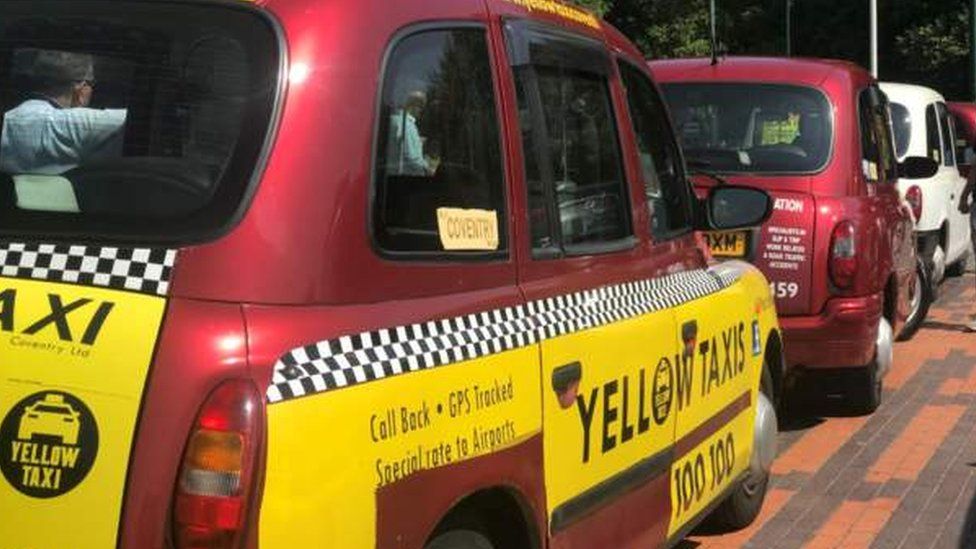Why is my taxi from another city?
- Published

If you've ever been in a cab and wondered why the driver's taxi licence was issued hundreds of miles away, the answer may lie in Wolverhampton.
The city has found itself at the centre of angry protests from cab drivers, who accuse the local council of making it too easy to enter the trade.
Cabbies from other parts of England and Wales say drivers newly licensed in the West Midlands are operating as far afield as Manchester and Southampton.
On Monday, private hire operators took part in the latest slow-drive through the city, calling on the authority to tighten rules around who gets permission to carry passengers.
They have taken similar action before, as have hackney carriage drivers.
Why are taxi drivers angry?
To date, the Labour-run council has licensed nearly 10,700 private hire minicab drivers. In a city of about 260,000, that's one for every 24 people.
But many are not working there.
In 2015 the law changed, meaning a private-hire driver does not have to live or operate in the local authority area that grants his or her licence.
And some say it is too easy to pass the test in Wolverhampton. The council strongly disputes this.
Is this a problem?
Many established taxi drivers say the Deregulation Act 2015 is threatening their livelihoods and claim a change in the application process is "risking customer safety".
Before April 2015, there were 852 private hire drivers licensed in Wolverhampton, according to the Department for Transport.
A twelvefold increase since then suggests many are not driving in the city, despite passing their test there.
Taxi drivers who have protested in Wolverhampton argue too many cannot speak English and do not have enough local knowledge of the areas they are actually working in.
Is it unusual?
Department for Transport figures show the number of drivers licensed by Wolverhampton increased by more than twice the rate of any other council in England and Wales between 2015 and 2017.
The overall number of drivers in Wolverhampton - whether private hire or taxi - rose 383% in those two years.
In June, black cab drivers from Coventry protested in Wolverhampton about the number of Uber drivers the authority had licensed.
Only one other council in the West Midlands, Telford and Wrekin, more than doubled the number of licences issued in the first two years since deregulation.
It went from 130 in 2015 to 306 in 2017.
You may also be interested in:
What does it mean for customers?
There is an argument the greater the number of licences issued the better it is for customers, as more competition means cheaper fares.
However, some existing drivers say changes to assessments for new drivers have led to safety being put at risk.
In Wolverhampton, new drivers previously had to pass a practical and theory test which contained a local area knowledge and A to Z route-plotting assessment.
Now they complete a driver training programme, which includes a verbal assessment in English, training on how to spot child sexual exploitation and they undergo a DVLA and criminal records DBS check.
They must prove they are allowed to work in the UK, have had a valid driving licence for 12 months and take a medical. It costs £69 and takes 20 working days.
Raheel Shah, chairman of Wolverhampton Private Hire Drivers' Association and a taxi driver for the past four years, said: "They should have never taken out the A to Z test.
"People need to be able to trust the drivers and know that they are getting into a car with someone who has passed the best possible tests.
"The driver needs to know the area and where they are going and be able to speak to customers.
"People will always go for the easiest and cheapest option. Which is why we say the council has to do something.
"Most people that get licensed here end up working in Manchester, Leeds, all over."
Scott Baldwin, a taxi driver from Derby who attended the protest in Wolverhampton on Monday, said "There's Wolverhampton-licensed drivers operating as far away as Southampton.
"This is not going to stop unless it's reined in. It'll carry on until the government intervenes."
What does the council say?
The chairman of City of Wolverhampton Council's licensing committee said drivers should protest against the government rather than the local authority.
Protests by taxi drivers are motivated by a desire to "restrict competition and customer choice, create local cartels and stifle technological innovation", the council claims.
Allow Twitter content?
This article contains content provided by Twitter. We ask for your permission before anything is loaded, as they may be using cookies and other technologies. You may want to read Twitter’s cookie policy, external and privacy policy, external before accepting. To view this content choose ‘accept and continue’.
It says though it cannot limit the number of private hire licences it issues, it does set its own assessment criteria.
Wolverhampton council has the cheapest application process in the Black Country and made about £2.2m from licensing in 2017/18.
The authority says private hire driver fees are "recovered for the service provided" and cannot be used for non-licensing matters.
It says digital changes have helped cut the time and cost of applying in Wolverhampton and these factors have made it the "licensing authority of choice". The council claims other authorities should "modernise" and follow its lead.
"The council's rules are robust and fit for purpose.
"Public safety is of paramount importance; putting artificial obstacles in the way of those wishing to work is simply wrong," a spokesman said.
Data journalism by Daniel Wainwright
- Published1 February 2018
- Published31 March 2017
- Published27 April 2018
- Published28 August 2012